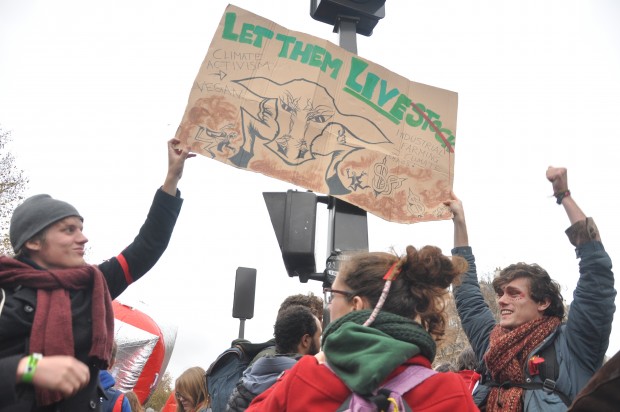
Environmental activists congregate near the Arc de Triomphe on Dec. 12, 2015, to call for climate justice. PHOTO BY SARA PACIA/INQUIRER.NET
PARIS – Moments after a historic agreement to curb global carbon emissions was adopted on December 12, 2015, at the 21st Conference of Parties (COP21), civil society was quick to remind the 195 countries involved that the real work in combating climate change is only beginning.
“Today the human race has joined in a common cause, but it’s what happens after this conference that really matters,” Greenpeace International executive director Kumi Naidoo said in a statement.
He added: “The Paris Agreement is only one step on long a road, and there are parts of it that frustrate and disappoint me, but it is progress. This deal alone won’t dig us out the hole we’re in, but it makes the sides less steep.”
The final 31-page Paris Agreement was adopted around 7:30 p.m at the climate conference’s last plenary meeting in Le Bourget, France. The pact will be signed by heads of the 195 involved parties tentatively around April 2016 and will take full effect by 2020.
READ: Nations adopt Paris agreement on climate change
Where is climate funding?
Helen Szoke, executive director of Oxfam International, said that while the deal had many countries come together in the fight against climate change, these same countries now must all the more be held accountable for their future actions.
“This deal offers a frayed lifeline to the world’s poorest and most vulnerable people. Only the vague promise of a new future climate funding target has been made, while the deal does not force countries to cut emissions fast enough to forestall a climate change catastrophe,” she said in a statement.
“We will be holding [governments] to account with the millions of people who marched in cities all around the world so that dangerous warming is averted and the world’s poorest and most vulnerable communities get the support that they need,” she added.
COP attendees erupted in loud applause as French Foreign Minister Laurent Fabius, COP21 president, lowered the gavel to signify that the pact is now in effect.
No optimism
But some members of civil societies worldwide, active both at Le Bourget and in various venues around Paris during the two weeks of negotiations, were not as optimistic as the delegates in attendance.
“At the moment the draft Paris agreement still puts us on track for 3-degree world,” said Asad Rehman, Friends of the Earth International head of climate action. “The reviews are too weak and too late. The political number mentioned for finance has no bearing on the scale of need. It’s empty.”
BACKSTORY: Civil society: Paris pact a ‘turning point in history
Other nongovernment organizations even hit the United States for not doing enough for climate justice despite its wealth and power.
US criticized
Lidy Nacpil, a Filipino activist with Asian People’s Movement on Debt and Development, doubted the United States’ sincerity in reducing its use of coal and fossil fuel to power factories, criticizing the country for being “all talk and no action.”
“The United States is a cruel hypocrite. Obama spoke about embracing the United States’ role of creating the problem and the need to take responsibility,” she said. “They created a clause that excludes compensation and liability for the losses and damages brought on by climate chaos. This is a deliberate plan to make the rich richer and the poor poorer.”
US Secretary of State John Kerry, who represented the United States at COP21, was also criticized for not bringing enough to the table at the negotiations.
“Kerry came to town with no confirmed funds for [the Green Climate Fund] and an INDC (intended nationally determined contributions),” said Victor Menotti, executive director of International Forum on Globalization. “Correcting this dangerous course requires the US climate movement to go home and work with other constituencies to replace (petroleum company) Koch’s procarbon candidates with real climate champions in the 2016 elections. Only then will ambition and equity have any hope.”
Paris as turning point
The United States is a member of the High Ambition Coalition, which supports a global temperature cap of 1.5 degrees Celsius or lower since preindustrial levels rather than a cap of 2 degrees.
READ: What’s behind movement for ‘high ambition’ in Paris?
Even with the mixed reactions and disappointments at COP21, however, civil society is more determined than ever to push the agenda of climate justice into mainstream consciousness.
“Now, the climate justice movement has come of age,” said Lucy Cadena, climate justice and energy coordinator of Friends of the Earth International. “December 12, 2015, marks a turning point for the balance of power. We move into 2016 strengthened, united and more determined than ever to hold our national governments to account.” TVJ
RELATED STORIES
PH welcomes Paris accord on behalf of climate victims
FULL TEXT: Philippine statement on Paris Agreement at COP21